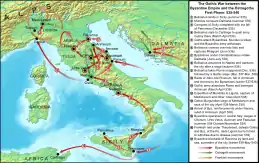535
Year 535 (DXXXV) was a common year starting on Monday (link will display the full calendar) of the Julian calendar. At the time, it was known as the Year of the Consulship of Belisarius without colleague (or, less frequently, year 1288 Ab urbe condita). The denomination 535 for this year has been used since the early medieval period, when the Anno Domini calendar era became the prevalent method in Europe for naming years.
| Millennium: | 1st millennium |
|---|---|
| Centuries: | |
| Decades: | |
| Years: |
| 535 by topic |
|---|
| Leaders |
|
| Categories |
|
| Gregorian calendar | 535 DXXXV |
| Ab urbe condita | 1288 |
| Assyrian calendar | 5285 |
| Balinese saka calendar | 456–457 |
| Bengali calendar | −58 |
| Berber calendar | 1485 |
| Buddhist calendar | 1079 |
| Burmese calendar | −103 |
| Byzantine calendar | 6043–6044 |
| Chinese calendar | 甲寅年 (Wood Tiger) 3231 or 3171 — to — 乙卯年 (Wood Rabbit) 3232 or 3172 |
| Coptic calendar | 251–252 |
| Discordian calendar | 1701 |
| Ethiopian calendar | 527–528 |
| Hebrew calendar | 4295–4296 |
| Hindu calendars | |
| - Vikram Samvat | 591–592 |
| - Shaka Samvat | 456–457 |
| - Kali Yuga | 3635–3636 |
| Holocene calendar | 10535 |
| Iranian calendar | 87 BP – 86 BP |
| Islamic calendar | 90 BH – 89 BH |
| Javanese calendar | 422–423 |
| Julian calendar | 535 DXXXV |
| Korean calendar | 2868 |
| Minguo calendar | 1377 before ROC 民前1377年 |
| Nanakshahi calendar | −933 |
| Seleucid era | 846/847 AG |
| Thai solar calendar | 1077–1078 |
| Tibetan calendar | 阳木虎年 (male Wood-Tiger) 661 or 280 or −492 — to — 阴木兔年 (female Wood-Rabbit) 662 or 281 or −491 |

The Gothic War: Belisarius subdues the Goths
Events
Europe
- April 30 – King Theodahad revenges himself upon Queen Amalasuintha. He has her taken from the capital of Ravenna to a small island on Lake Bolsena, where she is strangled in her bath.[1]
- The death of Amalasuintha gives Byzantine Emperor Justinian I a pretext to invade Italy and begin the Gothic War.
- The Byzantine city of Justiniana Prima is founded, and later becomes a bishop's seat of the Central Balkans.
Byzantine Empire
- Gothic War: Emperor Justinian I appoints Belisarius commander-in-chief (stratēgos autokratōr), and sends a Byzantine expeditionary force of only 8,000 soldiers (half are heavy East Roman cavalry) to begin the reconquest of Italy.[2]
- Summer – Belisarius lands in Sicily and meets little opposition, save for the Gothic garrison of Palermo. Laying siege to the citadel, he blockades the harbour with his ships. Mundus invades Dalmatia and captures its capital, Salona.
- Justinian I issues the Lex Julia and declares that a wife has no right to bring criminal charges of adultery against a husband. This makes divorce almost impossible in the Byzantine Empire.
- December 31 – Belisarius completes the conquest of Sicily, defeating the Gothic garrison of Palermo (Panormos), and ending his consulship for the year.
Africa
- Spring – Solomon defeats the Moorish rebels at Mount Mammes and Mount Bourgaon. He secures Byzacena (modern Tunisia) and establishes fortifications along the Numidian border.
- April – Justinian I reorganises the province as an African prefecture, centered in Carthage. He restores frontier defences, and returns property to the Catholic Church.[3]
Asia
- The Northern Wei Dynasty ends: The northern region of China is split into the Eastern Wei and the Western Wei during a civil war. The first ruler is Wen Di; he makes his son Fei Di crown prince.
- Significant to the history of agriculture, Chinese author Jia Sixia writes the treatise "Chimin Yaoshu" in this year, and although it quotes 160 previous Chinese agronomy books, it is the oldest existent Chinese agriculture treatise. In over 100,000 written Chinese characters, the book covers land preparation, seeding, cultivation, orchard management, forestry, animal husbandry, trade, and culinary uses for crops.
- Reports of the eruption of Krakatoa (Java), which possibly led to several years of climate change (see Extreme weather events of 535–536), are recorded in the Javanese Book of Kings.
Religion
- May 8 – Pope John II dies in Rome after a two-year reign, and is succeeded by Agapetus I as the 57th pope. He is sent on an embassy to Constantinople.[4]
- Byzantine troops drive the extremist Monophysite party out of Alexandria, and establish Theodosius I as patriarch of the Eastern Orthodox Church.
- Anthimus I becomes patriarch of Constantinople (535–536).
- A Christian basilica is completed at Leptis Magna in North Africa.
Meteorology
- The weather is reported to be unusually cold and dark in multiple parts of the world; see Extreme weather events of 535–536.
Births
Deaths
- May 8 – Pope John II[5]
- June 5 – Epiphanius, patriarch of Constantinople
- Eugippius, disciple and biographer
- Timothy III, Coptic Orthodox Patriarch of Alexandria
- Xie He, Chinese writer and art historian (approximate date)
- Xu Mian, official of the Liang Dynasty (b. 466)
- Xiao Wu Di, emperor of Northern Wei (b. 510)
References
- Jordanes, Vol. LIX, p. 51 and Herwig Wolfram (1998), p. 338
- J. Norwich, Byzantium: The Early Centuries, p. 215
- Rome at War (p. 55). Michael Whitby, 2002. ISBN 1-84176-359-4
- Breviarium S. Liberati, ap. Mansi, Concilia, Vol. IX, p. 695
- "John II | pope". Encyclopedia Britannica. Retrieved May 7, 2021.
This article is issued from Wikipedia. The text is licensed under Creative Commons - Attribution - Sharealike. Additional terms may apply for the media files.